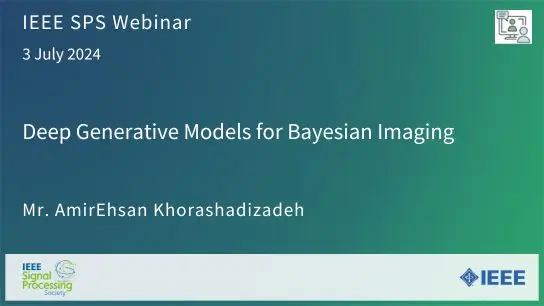Towards Designing an Explainable COVID-19 Diagnosis System
Dr. Yu-Huan Wu, Dr. Shanghua Gao
-
Members: FreeSPS
IEEE Members: $11.00
Non-members: $15.00Length: 00:51:03
26 Aug 2022
In the beginning of 2020, the coronavirus disease 2019 (COVID-19) has caused a pandemic disease in over 200 countries, affecting billions of humans. Identifying and separating the infected people during the early stage is the most important step in controlling
the pandemic. However, the main diagnostic tool, i.e., RT-PCR test, does not have high sensitivity for diagnosing COVID-19. However, chest CT is a valuable complementary tool in the early stage that offers high sensitivity. But chest CT test requires 21.5 minutes even for experienced radiologists that were severely lacking in the pandemic. Designing an automatic diagnosis system is highly desirable in solving this issue.
Based on the above motivation, we developed a novel Joint Classification and Segmentation (JCS) system to perform a real-time and explainable COVID-19 chest CT diagnosis. To enable the training of our system, we collected a large-scale COVID-19 classification and segmentation (COVID-CS) dataset, with 144K chest CT images of 400 COVID-19 patients and 350 uninfected cases. We annotated 3,855 chest CT images of 200 patients with fine-grained pixel-level labels of opacifications, which are increased attenuation of the lung parenchyma. We also have annotated lesion counts, opacification areas, and locations that benefit various diagnosis aspects. Extensive experiments demonstrate that the proposed JCS diagnosis system is very efficient for COVID-19 classification and segmentation. It obtains an average sensitivity of 95.0% and a specificity of 93.0% on the classification test set, and 78.5% Dice score on the segmentation test set of our COVID-CS dataset. The COVID-CS dataset and code are available at https://github.com/yuhuan-wu/JCS.
the pandemic. However, the main diagnostic tool, i.e., RT-PCR test, does not have high sensitivity for diagnosing COVID-19. However, chest CT is a valuable complementary tool in the early stage that offers high sensitivity. But chest CT test requires 21.5 minutes even for experienced radiologists that were severely lacking in the pandemic. Designing an automatic diagnosis system is highly desirable in solving this issue.
Based on the above motivation, we developed a novel Joint Classification and Segmentation (JCS) system to perform a real-time and explainable COVID-19 chest CT diagnosis. To enable the training of our system, we collected a large-scale COVID-19 classification and segmentation (COVID-CS) dataset, with 144K chest CT images of 400 COVID-19 patients and 350 uninfected cases. We annotated 3,855 chest CT images of 200 patients with fine-grained pixel-level labels of opacifications, which are increased attenuation of the lung parenchyma. We also have annotated lesion counts, opacification areas, and locations that benefit various diagnosis aspects. Extensive experiments demonstrate that the proposed JCS diagnosis system is very efficient for COVID-19 classification and segmentation. It obtains an average sensitivity of 95.0% and a specificity of 93.0% on the classification test set, and 78.5% Dice score on the segmentation test set of our COVID-CS dataset. The COVID-CS dataset and code are available at https://github.com/yuhuan-wu/JCS.


